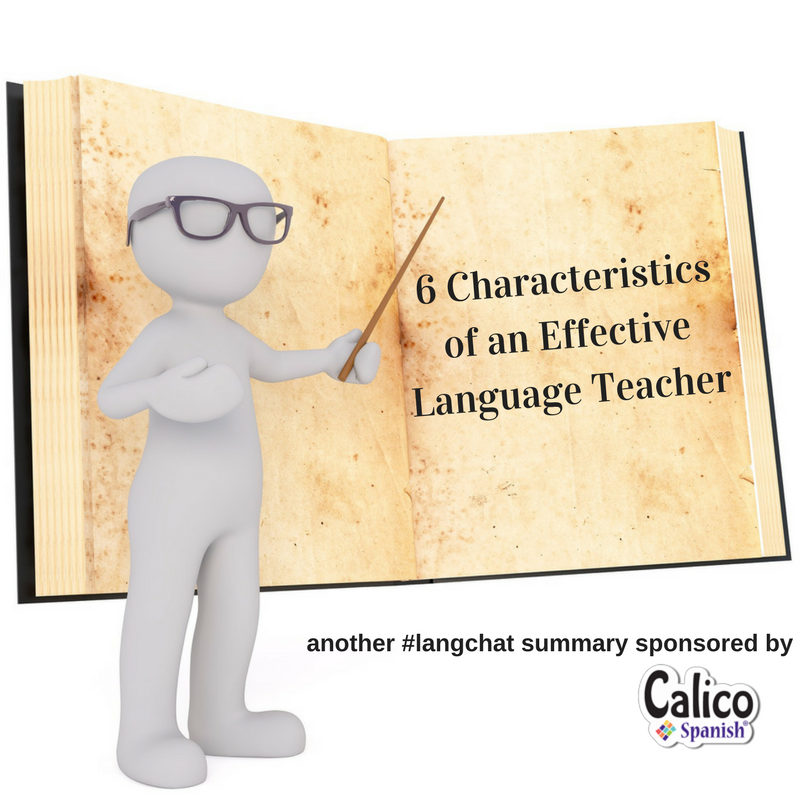Six Characteristics of an Effective Language Teacher
What makes a language teacher effective? That was the topic for this week’s #LangChat. Participants generally agreed that effective teachers speak the target language well (preferably at an advanced level) and also understand the target culture. Language teachers also need to be clear regarding their goals in the classroom. If your goal is to improve students’ language proficiency, then you can determine world language teacher effectiveness through measurable learning (@tmsaue1). Make sure your students understand your goals. For example, students need to understand what proficiency is and what it means to communicate (@dlfulton).
– Follow the blog on Bloglovin –
Effective teachers are proficient.
How can we demonstrate proficiency to students? How can we set an example?
- Show them the power of languages and how to use language effectively. @klafrench
- Know the language we are teaching. Language teachers need to understand target culture beyond postcard knowledge. @DiegoOjeda66
- Knowing the language is imperative, but so is knowing about second language acquisition. The fact that I am a native speaker of the language does not make me an effective teacher. @suarez712002
- I am not a native speaker. The benefit is students see me learning new things and being frustrated, but persevering. Good lesson I think. @pjenn86
- We have to be role models by showing students what having a passion for a language means. @klafrench
– Like Calico Spanish on Facebook –
Effective teachers inspire.
- Effective teaching means being passionate about learning, loving kids, wanting to get them ENGAGED, and communicating. Also, helping kids to learn and not be afraid of making mistakes, trying out the new culture, and fostering tons of curiosity. @dr_dmd
- Effective world language teachers inspire lifelong learning and show students a bigger world through experiencing cultures and peoples with language and communication. @worldlanguages
- Effective world language teachers must motivate students to use target language whenever possible and inspire passion for language and culture! @melindamlarson
- For middle school, being an effective teacher means getting students excited to learn the language/culture–even when it’s a mandatory class. @pjenn86
- Effective teachers empower students. @DiegoOjeda66
– Follow Calico Spanish on Twitter –
How do we inspire the kids? Many participants stressed the need for a warm, inviting class atmosphere. Mistakes should be used as a learning opportunity, not something students need fear.
What do we do?
- We inspire, we model curiosity, we create engaging contexts for language practice and communication. @dr_dmd
- Give students the opportunity to use the language in many ways and outside of the classroom. Help the students understand that being successful also means making mistakes. Give them permission to fail. @cadamsfl
- Teach students to use the second language in ways that interest them–it will get them more motivated to use it outside of class! @espanolsrs
- Effective world language teachers should also teach techniques and strategies to empower students to take risks with the target language (ex: circumlocution). @melindamlarson
- We, as lang teachers, have to create an environment where kids feel successful no matter what. @lesliedavison
– Follow us on Instagram too! –
Effective teachers see mistakes as learning opportunities.
Several people agreed that mistakes should be used as a learning opportunity in the classroom. Mistakes are part of the learning process, and students should be made to feel that mistakes are accepted and ok. Everyone makes mistakes, and the learning environment needs to be receptive to this.
@pjenn86 asked,
Do teachers always correct a pronunciation mistake right away?
- That is not a problem as long as you do it in a respectful and sensitive manner. I do not demand that they repeat the word after the correction. @DiegoOjeda66
- No. Depends on the situation and the child. I try to correct it where it will have the largest impact inside not outside. @cadamsfl
- I sometimes praise mistakes, especially when they recognize and try to self-correct. If I can get the gist of what a student is saying, I try not to correct, just model. @sraoconnor
- Correct when an error interferes with communication. When correcting focus on the “meaning.” If a student said, “I go to the movies yesterday,” say “you GO to the movies yesterday”? @suarez712002
Effective teachers are always improving.
Several participants mentioned how important it is to always be improving, both in teaching and language ability. How? Ways to do so include analyzing one’s own practices and learning from peers.
- Effective teachers know how to be reflective about their practices. @gretafromtexas
- Teachers must be passionate about cultivating their own language proficiencies. Teachers get to be life-long students–always learning, always curious. Passionate teachers share what they are learning as well–show what it looks like to be a learner. @dr_dmd
- It works! I made a big one (mistake) this week. I used the opportunity to teach “comettre une erreur.” @klafrench
In the journey to improve, some participants suggested observing peers. However, many lamented the fact that they don’t have many opportunities to observe other teachers’ language classes.
- Effective teachers don’t have all the answers, but create environments to explore new answers from peers. @DonaKimberly
- Key concepts of professional learning communities: 1) observing other teachers and 2) creating common assessments. @suarez712002
- Peer observations are excellent collaboration tools, but must not be tools to make us all be the same. @dr_dmd
Effective teachers choose content wisely.
Several teachers questioned how much grammar an effective language teacher should teach in the classroom. Does being an effective language teacher mean being an effective grammar teacher? As @tmsaue1 pointed out,
Sometimes I see teachers who are very effective in delivering grammar instruction, but I don’t think that’s what we mean by effective language teacher.
Even as @sraoconnor pointed out that many colleagues do expect that kind of grammar instruction from every effective language teacher, @cadamsfl summarized the #langchat perspective that students’ grammar focus should be used “to communicate more effectively and connect with the world around them.” @DiegoOjeda66 explicitly said, “Effective teachers do not have to teach grammar.”
What about teaching the textbook?
Several people said that they don’t use the textbook very often in class. Several others lamented colleagues who held them accountable to teaching everything in the book. Most commenters felt it’s more important to teach to the student than to the textbook. @suarez712002 emphasized that she uses the textbook as a resource. A link to an insightful blog post titled, “Teaching to Educate vs. Teaching to Test” was posted by @worldlanguages: http://tinyurl.com/3h6s2ug.
Effective teachers learn and use effective techniques.
Participants also shared several techniques they believe effective teachers employ.
- @dlfulton: Be willing to give students a little content and then then step aside for a while and let students USE it. [As it’s also important to teach to the students’ differing levels,] “my lessons change/vary slightly from class to class to reflect what the students in each class need.”
- @cadamsfl: Take advantage of what’s going on now and use the language. It helps the students to practice and use “real” language, and not the textbook. Lesson plans are always different every year because they are driven by what is happening in the world.
- @dr_dmd: Bring the world into the classroom–so many ways to do that: pics, videos, texts from the net.
- @DiegoOjeda66: Effective language teachers are natural born actors and are not afraid to take multiple personalities in class. They can use this to bring their own experiences to life in the classroom. @DiegoOjeda66
- @cadamsfl: At the end of the year, we connect all of the lessons and talk about what they can do now that they couldn’t before.
- We try to connect lessons throughout the year, not wait until the end–keep ongoing lists of “can-do’s.” @dlfulton
Visit the #LangChat Wiki for the full archive of the conversation and additional #LangChat Archive links, as well as great resources from teachers around the world.
Since this #langchat summary was published, many resources have been added to the TELL project, a collaboration dedicated to discovering and promoting elements that help language teachers be more effective. Check it out today!







One comment
Thank you so much.. really useful article
I am a non – native speaker, working as an English teacher. I am still new in the field, applying for CELTA and I have the thirst to learn and I wish to be an effective teacher as I love my students and wish to give them quality teaching..